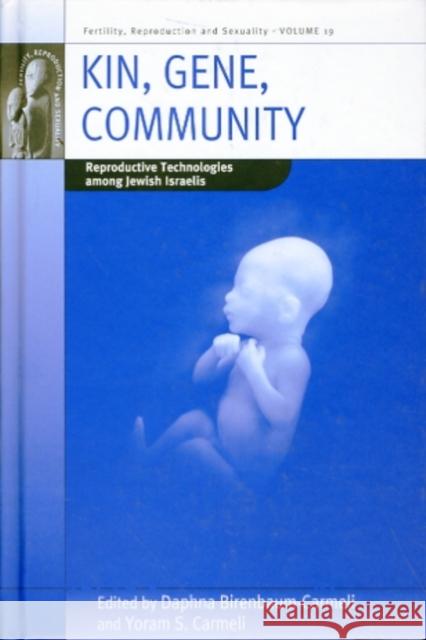Kin, Gene, Community: Reproductive Technologies Among Jewish Israelis » książka
Kin, Gene, Community: Reproductive Technologies Among Jewish Israelis
ISBN-13: 9781845456887 / Angielski / Twarda / 2010 / 344 str.
Israel is the only country in the world that offers free fertility treatments to nearly any woman who requires medical assistance. It also has the world's highest per capita usage of in-vitro fertilization. Examining state policies and the application of reproductive technologies among Jewish Israelis, this volume explores the role of tradition and politics in the construction of families within local Jewish populations. The contributors-anthropologists, bioethicists, jurists, physicians and biologists-highlight the complexities surrounding these treatments and show how biological relatedness is being construed as a technology of power; how genetics is woven into the production of identities; how reproductive technologies enhance the policing of boundaries. Donor insemination, IVF and surrogacy, as well as abortion, pre-implantation genetic diagnosis and human embryonic stem cell research, are explored within local and global contexts to convey an informed perspective on the wider Jewish Israeli environment. Daphna Birenbaum-Carmeli is a medical sociologist at the University of Haifa, Israel. Her research concentrates on reproduction-related issues and the interface of health care and state politics. Birenbaum-Carmeli has published extensively in major professional journals and is the author of Tel Aviv North: The Making of a New Israeli Middle Class (Hebrew University Press) and the co-editor (with Marcia C. Inhorn) of Assisting Reproduction, Testing Genes: Global Encounters with New Biotechnologies (Berghahn Books). Yoram S. Carmeli is an anthropologist at the University of Haifa, Israel, who has researched reproductive technologies in Israel. His other writings focus on popular culture with a particular interest in British circuses. He has also researched sport and consumption in Israel. Carmeli is the co-editor (with Kalman Applbaum) of Consumption and Market Society in Israel (Berg Publishers).
Israel is the only country in the world that offers free fertility treatments to nearly any woman who requires medical assistance. It also has the worlds highest per capita usage of in-vitro fertilization. Examining state policies and the application of reproductive technologies among Jewish Israelis, this volume explores the role of tradition and politics in the construction of families within local Jewish populations. The contributors-anthropologists, bioethicists, jurists, physicians and biologists-highlight the complexities surrounding these treatments and show how biological relatedness is being construed as a technology of power; how genetics is woven into the production of identities; how reproductive technologies enhance the policing of boundaries. Donor insemination, IVF and surrogacy, as well as abortion, pre-implantation genetic diagnosis and human embryonic stem cell research, are explored within local and global contexts to convey an informed perspective on the wider Jewish Israeli environment.Daphna Birenbaum-Carmeli is a medical sociologist at the University of Haifa, Israel. Her research concentrates on reproduction-related issues and the interface of health care and state politics. Birenbaum-Carmeli has published extensively in major professional journals and is the author of Tel Aviv North: The Making of a New Israeli Middle Class (Hebrew University Press) and the co-editor (with Marcia C. Inhorn) of Assisting Reproduction, Testing Genes: Global Encounters with New Biotechnologies (Berghahn Books).Yoram S. Carmeli is an anthropologist at the University of Haifa, Israel, who has researched reproductive technologies in Israel. His other writings focus on popular culture with a particular interest in British circuses. He has also researched sport and consumption in Israel. Carmeli is the co-editor (with Kalman Applbaum) of Consumption and Market Society in Israel (Berg Publishers).











